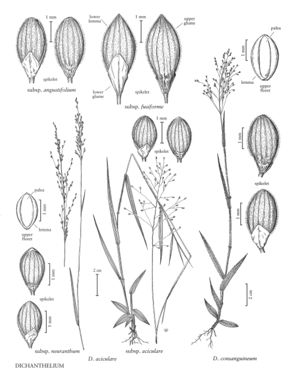familyPoaceae
subfamilyPoaceae subfam. Panicoideae
genusDichanthelium
speciesDichanthelium aciculare
subspeciesDichanthelium aciculare subsp. aciculare
Difference between revisions of "Dichanthelium aciculare subsp. aciculare"
Treatment appears in FNA Volume 25. Treatment on page 444.
FNA>Volume Importer |
FNA>Volume Importer |
||
| Line 35: | Line 35: | ||
|publication year= | |publication year= | ||
|special status= | |special status= | ||
| − | |source xml=https://jpend@bitbucket.org/aafc-mbb/fna-data-curation.git/src/ | + | |source xml=https://jpend@bitbucket.org/aafc-mbb/fna-data-curation.git/src/f6b125a955440c0872999024f038d74684f65921/coarse_grained_fna_xml/V25/V25_1205.xml |
|subfamily=Poaceae subfam. Panicoideae | |subfamily=Poaceae subfam. Panicoideae | ||
|tribe=Poaceae tribe Paniceae | |tribe=Poaceae tribe Paniceae | ||
Revision as of 19:22, 24 September 2019
Plants densely cespitose. Culms usually 15-35 cm, usually pubescent, at least on the lower internodes; nodes sometimes bearded, usually yellowish; lower internodes puberulent to appressed-pilose. Cauline blades usually 4-6 cm. Primary panicles usually open, branches spreading to ascending, not appearing 1-sided. Spikelets 1.7-2.3 mm, obovoid, blunt.
Discussion
Dichanthelium aciculare subsp. aciculare is common in sterile, open sands on the coastal plain. It is restricted to the eastern United States and Mexico.
Selected References
None.
Lower Taxa
None.
... more about "Dichanthelium aciculare subsp. aciculare"
